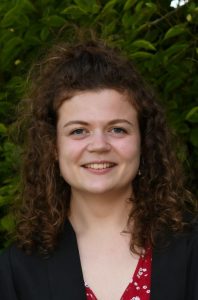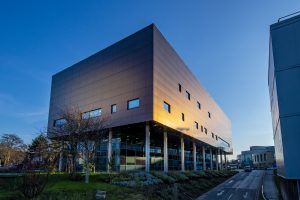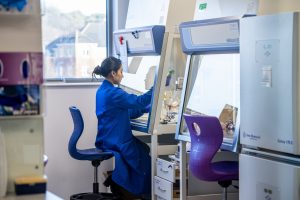Esme Fowkes is currently in her first year of the Centre for Cancer ImmunologyŌĆÖs integrated PhD programme. Working alongside the UKŌĆÖs leading cancer scientists, Esme is working to improve vaccines to fight cancer.
As cancers grow they accumulate mutations across the genome, which is known as the mutanome. This can result in the expression of new proteins called neoantigens, which are not expressed elsewhere in the body. T-cells can recognise these neoantigens as ŌĆśnon-selfŌĆÖ and mount immune responses against them to attack the cancer cells, but these responses are often weak, and the cancer can evade it. ┬ĀMutanome vaccines deliver tumour neoantigens into the body in a way which induces a strong immune response that can destroy cancer cells. Mutanomes can contain thousands of mutations but usually, less than 20 are included in a vaccine. Therefore, the selection of neoantigens which will result in the strongest immune response, is a critical step of vaccine design.
Esme Fowkes, PhD studentSouthampton is a leading institution in cancer immunology research, and with the Centre for Cancer Immunology being the first centre in the UK dedicated solely to this field, I knew I wanted to study there.
Esme is currently working with Dr Natalia Savelyeva to improve the selection of antigens for personalised vaccines for patients. The study is investigating how well┬Ācomputer modelling prediction methods for the strength of neoantigen T cell responses align to observations┬Āin vivo┬Āfollowing vaccination. Esme is also looking at strategies which could increase vaccine induced anti-tumour immunity, in particular increasing the numbers of tissue resident memory T cells which are associated with improved outcomes for cancer patients.
Esme said: ŌĆ£Cancer vaccines have massive potential to fight cancer without the toxicity associated with current treatments such as chemotherapy and provide improved long term protection against recurrence, ultimately increasing the survival time of cancer patients. But developing cancer vaccines is very complex as each personŌĆÖs cancer is somewhat unique to them. We hope this study will take a step forward in development of this much needed treatment method.ŌĆØ
Esme decided to come to study at Southampton due to its international reputation for bench to bedside results in cancer research.

ŌĆ£I was drawn by the cutting edge research, the state-of-the-art facilities, and the emphasis on a collaborative approach to accelerate progress,ŌĆØ Esme explained. ŌĆ£Southampton is a leading institution in cancer immunology research, and with the Centre for Cancer Immunology being the first centre in the UK dedicated solely to this field, I knew I wanted to study there.
ŌĆ£Additionally, I felt the integrated PhD course structure offered at Southampton would give me the opportunity to explore my interests in different areas of exciting, new research and gain a variety of experiences in through lab rotations in the first year, preparing me to be a better research scientist.ŌĆØ

Before coming to Southampton, Esme graduated the University of Cambridge after studying Natural Sciences, specialising in virology and immunology in her third year.┬ĀHer passion for cell biology and disease and the complexities and inner workings of the cell and the interactions between cells inspired her to focus her studies on cancer immunology.
She said: ŌĆ£Sadly, cancer is still a huge cause of mortality worldwide, touching everyoneŌĆÖs life in some way. Fortunately, growing research into harnessing the immune system against cancer in immunotherapies shows real promise in fighting the disease through drastically more targeted and long term treatments, with a few licensed treatments already improving prognosis for certain patients.ŌĆØ
Esme Fowkes, PhD studentCancer vaccines have massive potential to fight cancer without the toxicity associated with current treatments such as chemotherapy and provide improved long term protection against recurrence, ultimately increasing the survival time of cancer patients.
The Centre was the first to launch an integrated PhD┬Āin Cancer Immunology when it opened in 2018.┬Ā Esme is one of around 30 PhD students currently studying at the Centre. Her position is funded through a scholarship supported by the Cancer Immunology Talent Fund, which aims to develop the next generation of cancer immunology scientists. The Fund is made up of entirely philanthropic donations.
Esme said: ŌĆ£Funding medical research is incredibly important to expand the field and push it forward, and it is extremely humbling to know individuals are supporting me. Their generous donations are helping me to have a strong start in my dream career in cancer research and, more importantly, train me to be able to carry out research which, in collaboration with many others in Southampton and across the world, will help to develop treatments to improve prognosis for cancer patients and ultimately save lives.ŌĆØ
Looking to the future, Esme said: ŌĆ£Long term, I plan to pursue a career in academic research focussing on cancer biology. I hope to work at a range of institutions and collaborate with other research groups. As my careers progresses, I would consider opportunities such as roles on scientific journal editorial boards to aid communication in the scientific community, and academic teaching to inspire the next generation of scientists.ŌĆØ
